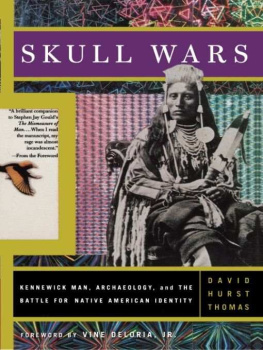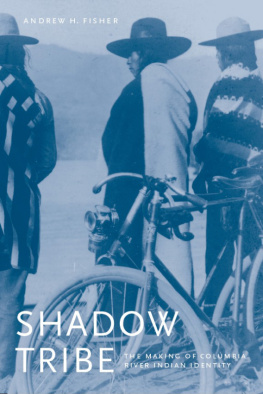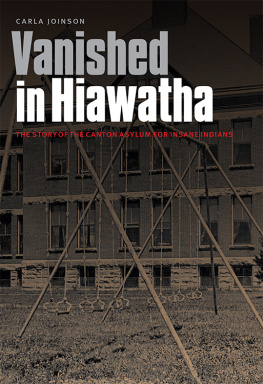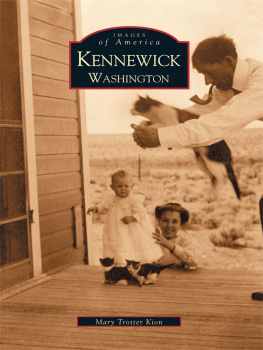Table of Contents
PRAISE FOR SKULL WARS :
From page one, Skull Wars is a book you cant put downpacked with fascinating, shocking, controversial and moving stories that present a sweeping picture of American archaeology and anthropology at its best and worst. It is beautifully written, impeccably researched, completely engrossing, and one of the best books on archaeology I have ever read.
Douglas Preston
Author of Cities of Gold and Thunderhead
Skull Wars is a very good piece of historical investigative journalism and ethnography that chronicles the rise of antagonisms between Indian, Anthro and Bureaucrat tribes. It will outrage the radicals on all sides and give solace and direction to those seeking solutions.
Don D. Fowler
Mamie Kleberg Professor of Historic Preservation and Anthropology
University of Nevada, Reno
Thomas has taken a very important issue and dissected it brilliantly for the general reader. His story and his messagethat we need to face history honestly and listen to each other carefullyshould be read by everyone who believes that science can serve humanity. He has done a great service to the cause of cross-cultural understanding.
Fred Hoxie
Swanlund Professor of History
University of Illinois at UrbanaChampaign
Hurray for David Hurst Thomass Skull Wars ! It is at once meticulously exact in the information presented, skillful in its narrative, and written in good, eloquent prose. A book, not a mere treatise, its moral purpose is to induce respectful and therefore productive relations between Thomass fellow archaeologists and the descendants of their subjects.
Roger G. Kennedy
Director Emeritus of the National Museum of American History,
former Director, National Park Service,
and author of Burr, Hamilton and Jefferson
Skull Wars is not just a good book but a great book: well-written, interesting, and evenhanded. Thomas does a fantastic job of showing how good research can be done in collaboration with the Indian community.
Clark Larsen
Amos Hawley Professor of Anthropology
University of North Carolina, Chapel Hill
Skull Wars holds a mirror up to the archaeological community. By helping us see ourselves as we are, Thomas book will help us understand the sometimes awkward and contentious, but potentially enriching, relationships that can and must be forged between Native Americans and archaeologists.
David J. Meltzer
Southern Methodist University
Skull Wars treads on delicate and controversial historical ground avoided by many scientists. With characteristic and refreshing frankness, David Hurst Thomas explores competing visions of the early American past and points the way to a new scholarly world where archaeologists do not necessarily call the intellectual shots. This extraordinary and important book is bound to send shock waves through the halls of academe.
Brian Fagan
Author of The Great Journey and Floods, Famines, and Emperors
An outstanding scholarly study of the root causes of the distrust between archaeologists and Native American groups.... [An] important piece of work.
Library Journal
Thorough, detailed, important and well documented.
The Seattle Times
The ancient history of America is being rewritten, and David Hurst Thomas has written a report from the front lines.
Insight
A NOTE ABOUT HUMAN REMAINS
This book argues, among other things, that scientists must deal with human bones in a more respectful and sensitive manner. Several Native American elders have requested that I not publish photographs or other depictions of American Indian skeletal remains. In specific response to this request, no such images appear in this book.
A significant portion of the proceeds from this book are being donated to the Arthur Parker/Native American Scholarship Fund of the Society for American Archaeology. I believe strongly in this program, which is specifically designed to assist Indian people wishing to pursue advanced studies in archaeology. I respectfully request that other archaeologists writing booksfor-profit about American Indians give some serious thought to donating (at least part of) their royalties to the Parker Fund.
I believe its a wise investment.
DHT
FOREWORD
WE HAVE TOO much information today. We are saturated by isolated facts for which we have great difficulty finding any familiar context. Indeed, publication no longer means acceptance by a prestigious journal. It can often mean simply posting an item on the Internet or talking with a reporter. We have come to believe that what is new is true, and so almost anyone can represent anything by merely appearing as a public figure in a discussion. How then can we make sense of what we think we know? One pseudo-fact can become the pivotal point in a controversy no one understands. Nowhere is this condition more endemic than the social sciences, but geology and archaeology contribute more than their share of confusion.
The social sciences badly need to take a break, collect their thoughts, begin to produce reliable histories of their respective disciplines, and clearly articulate their fundamental doctrines so that we can see the various trees of thought that represent the forests in which we labor. At present only people trained in the various social sciences have any idea where they began, where they have traveled, and where they are now. Lay people have not the slightest notion where social science doctrines and ideas originate. Nor do they know what are acceptable beliefs to which a majority of any discipline would subscribe. Scholars working in other disciplines rarely get a glimpse into the inner working of neighboring sciences, so they accept much of the core scientific doctrine in the belief that others have been as rigorous, informed, and sincere as themselves.
The Law provides a sensible and useful model for the social sciences to consider. Recognizing that doctrines change with the passage of time, the development of new theories, and the admissibility of new kinds of evidence, the legal profession has a practice of appointing a prestigious committee of experienced scholars and practicing lawyers to review the various fields of law and issue what are called Restatements. These documents summarize the current state of such topics as contracts, torts, procedure, and so forth. Judges, justices, practicing attorneys, legal aids, and interested lay people can turn to the Restatements and find an authoritative interpretation of the state of law without engaging in endless searches or being drawn into internecine battles about the primacy of any particular doctrine.
Such a practice might be immensely useful to the rest of the academic disciplines in ensuring that they remain credible sources of reliable information. The American Anthropological Association sent a statement to the Bureau of the Census in 1998 stating that race could not be determined scientifically. At the same time several prominent scholars were in federal court claiming that they had an overwhelming need to do tests on a skeleton found on the banks of the Columbia River, and many archaeologists encouraged the media to believe that they could determine the race of the remains. How can we have such conflicting views? What is the orthodox and proven here and what is speculation?.
Fortunately, we have before us now a major effort to provide an honest history of American archaeology, at least as it has touched human beingsa topic that has hitherto been avoided or summarized in exotic technical articles inaccessible to most interested people. It is, frankly, refreshing and liberating to read Skull Wars , since some of the recommended readings I have encountered have been more in the nature of theological apologetics than starkly honest. Here we have a book that serves as a brilliant companion to Stephen Jay Goulds The Mismeasure of Man in educating us about the troubles and triumphs of establishing a body of knowledge about our ancestors. Skull Wars , consequently, will draw a certain amount of fire from the profession for its frankness and its invitation to the public to learn more about archaeologymore, perhaps, than the profession would like us to know.








